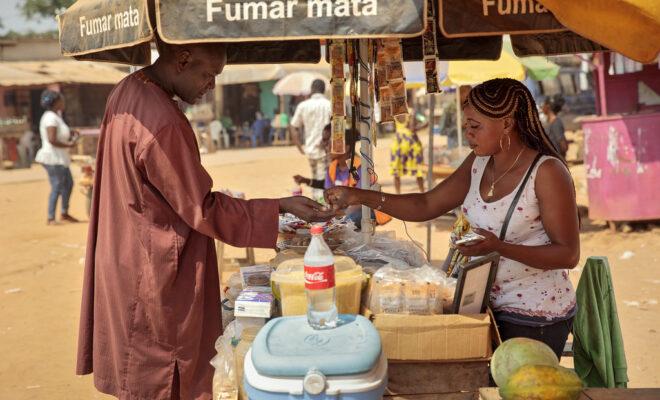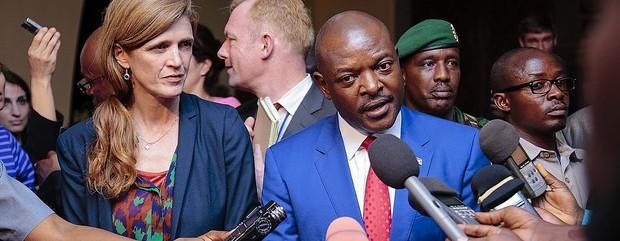The question no-one’s asking about Facebook’s big new idea

Could Facebook’s new digital currency become a country’s de facto national currency?

In small economies, could a national currency slowly be replaced with libra? Credit: UN Women/Ryan Brown.
Earlier this year, when Facebook announced its plan to help launch a new digital currency called Libra in 2020, many Western politicians reacted with scepticism and alarm. In the US, lawmakers in Congress twice summoned the head of the project to answer questions before inviting CEO Mark Zuckerberg himself.
They asked whether the digital currency – which would exist only electronically and allow money to be transferred instantaneously across borders – could be used to launder money. They asked whether it would affect the US dollar’s status as the global reserve currency. They even asked whether it could impact their government’s ability to levy sanctions.
Throughout the 12 hours of hearings, however, no member of Congress asked what is perhaps the most pressing question about libra: Could this corporate currency end up replacing a country’s national currency?
According to Facebook, libra cannot disrupt the financial systems of certain powerful nations because it will use their currencies in its reserve, alongside financial assets such as government-issued securities. But these countries are not libra’s main targets; instead, the project has taken aim at users in the Global South, including in Africa. The Libra Association has placed images of market women in Lagos and other scenes from the continent in its adverts, and Facebook emphasises that the digital currency will serve people who lack bank accounts, many of whom are in Africa.
Libra could prove highly attractive on the continent. Facebook plans to integrate it into popular platforms such as WhatsApp and the currency would be free to use unlike existing mobile money services which charge small fees. This convenience and lack of cost could lead consumers to increasingly use libra for everything from transferring money to relatives to paying for everyday purchases such as food and transport.
At the individual level, this could benefit users, but serious risks would emerge if the majority of a population were to adopt libra as the de facto national currency. This is not a far-fetched prospect in countries with small economies and little geopolitical power. If inflation were to reduce the national currency’s value in such a country, people might swap it for libra in order to protect their savings. This would drive down the value of the national currency even further, contributing to a vicious feedback loop.
Because dumping the national currency would be as easy as pushing a button on a phone, this process could start quite suddenly and be very difficult to stop. In the past, currency hops have typically been the result of sustained political and/or economic crises. The technological threat that libra poses to currencies is entirely new.
Abandoning the national currency for libra could have several negative effects. First, it would constrict that government’s ability to conduct monetary policy. Governments sometimes inject money into specific areas of the economy in order to boost the economy as a whole. If the national currency had little value, this strategy would be rendered ineffective. Particularly in times of economic distress, the inability to use this fiscal strategy could worsen the downturn.
Second, as the Greek economist and politician Yanis Varoufakis has argued, “a Libra token’s purchasing power in any given country would fluctuate a great deal more than the domestic currency”. This is because when a financial asset is backed by several other assets that are denominated in multiple currencies, it tends to be more volatile in the near-term despite its long-term stability. In other words, if libra replaces the national currency, consumers would likely see the prices of goods and services change noticeably from month to month, making it more difficult to plan for future expenses. Varoufakis also points out that the libra network presents a major capital flight risk, as this borderless value transfer system could allow people to send large amounts of money abroad without securing the permission of relevant authorities.
Another major problem is that the last people in the country to make the transition to libra would be buying these digital tokens with a national currency that is practically worthless. As a result, they’d have to accept miserably low exchange rates, which would largely wipe out their savings.
Finally, there’s the risk of the economy being “switched off” when internet access is interrupted. It’s concerning enough that authoritarian leaders today can block internet access for political purposes, but this power takes on a frightening new dimension when shutting down the internet means shutting down the monetary system as well.
In light of all these dangers, it is alarming that the Libra Association has not shared its strategy for averting a mass currency dump.
As Ramesh Srinivasan argues in Beyond the Valley, would-be users of new technologies must pay close attention to the effects of innovations. We must educate ourselves on how they might function (or malfunction) and reject the ones that appear to fall short of our minimum safety demands.
In most countries, it is taken for granted that people should be able to choose their political leaders. But as governments appear less and less up to the task of regulating big tech, we should also demand a more meaningful role in choosing – or even designing – the technologies that increasingly impact our lives.






